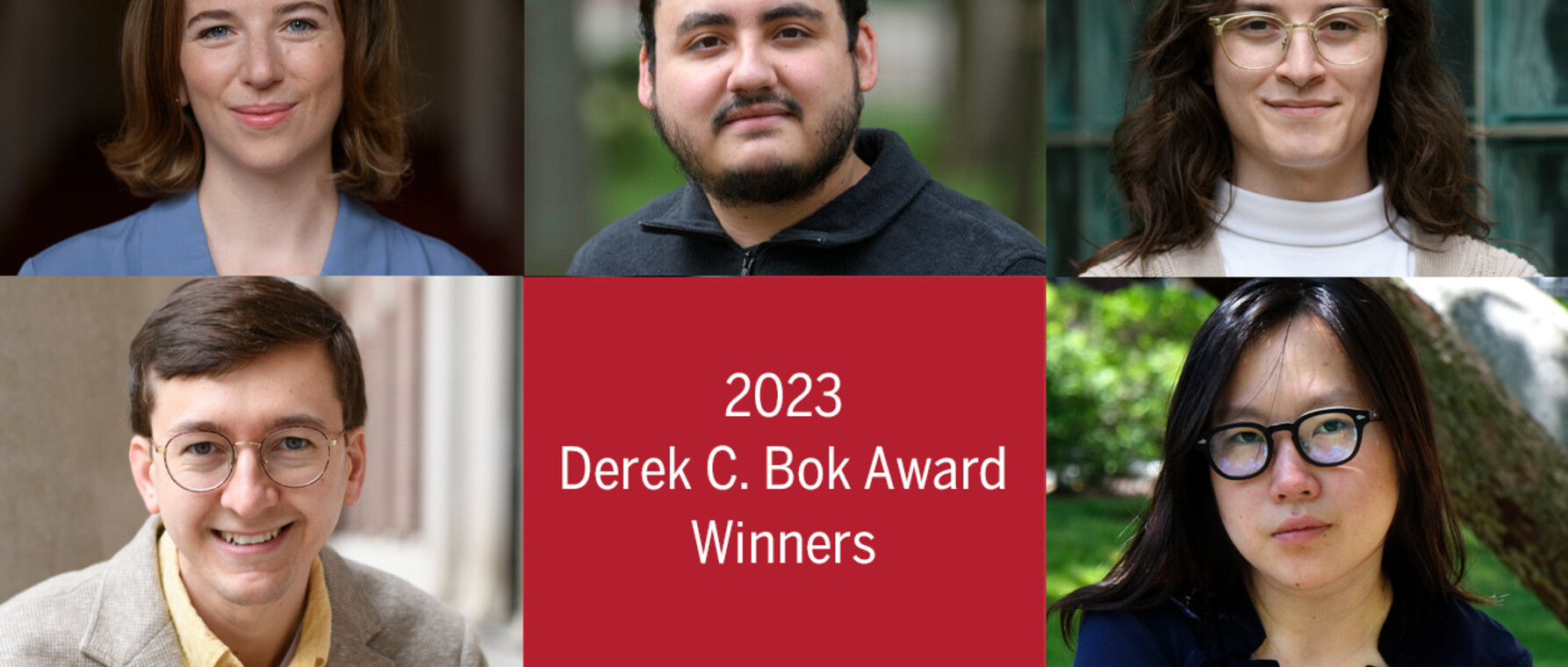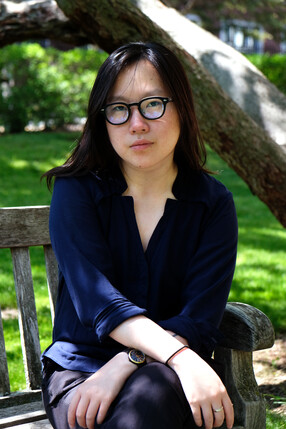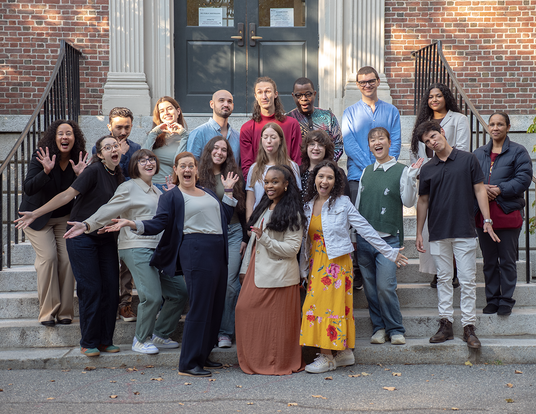Inspiring Undergraduate Learners: The 2023 Derek C. Bok Awards
Graduate students recognized for commitment to teaching and mentorship

Harvard Griffin GSAS is a place where students learn to be scholars, scientists, and researchers—those who create knowledge. Just as important, however, is the School’s role as a training ground for those who inspire others to learn and discover. The five recipients of the 2023 Derek C. Bok Award for Excellence in Graduate Student Teaching of Undergraduates exemplify these extraordinary young teachers and mentors.
This year’s Bok award-winners dedicated themselves to the needs of undergraduate students in a wide range of disciplines. In so doing, they developed innovative curriculum, provided needed insight and support, and enabled those in their classes to master challenging subject matter—all while engaged with the rigors of their own academic programs.
For their remarkable commitment to teaching and mentorship, the winners of the 2023 Bok Awards—made possible thanks to an endowment established by David G. Nathan ’51, MD ’55, the Robert A. Stranahan Distinguished Professor of Pediatrics at Harvard Medical School, and his wife Jean Louise Friedman—received a $1,000 prize and a certificate bearing the citations below.
Ellen Finch: Care and Success
With unrivaled skill, commitment, and enthusiasm, Ellen Finch has accumulated an impressive teaching record in the Department of Psychology, exemplifying excellence and a dedication to teaching and mentorship. “What we believe distinguishes Ellen,” said Allie Pagano, graduate program manager in psychology, and Katie Powers, associate director of undergraduate studies in psychology, in their nomination, “is the care she extends to all her students and her ability to succeed at the highest level across all her teaching and mentoring experiences.”
Finch served as a teaching fellow for several lecture courses and an instructor for the department’s sophomore tutorial—the latter divided into small weekly seminars led by advanced graduate students or post-doc instructors in which undergraduate concentrators are taught how to read, write, and think like psychological scientists. While the department provides guidance on course policies and assignments, the design of the course, selection of readings, class lesson plans and activities, and grading and feedback are the responsibility of the tutor. Pagano and Powers say that Finch’s long-term commitment to these intensive courses—which demand a tremendous investment of time, thought, and energy on the part of the tutors—has been extraordinary.
“It is incredibly rare for a graduate student to elect to hold this position for two full years,” they wrote, “and something we see only from students like Ellen who demonstrate an unwavering commitment to educating undergraduates and truly enjoy these roles.”
Joe Gonzales: Laying a Solid Foundation
With an eagerness to find innovative and engaging ways to present material, Joe Gonzales creates a classroom environment that fosters critical thinking, collaboration, and creativity. A PhD student in the Department of Chemistry and Chemical Biology, Gonzales is so adept at connecting with students on a personal level that students consistently rate him as one of their most impactful teachers. “We have overseen graduate student teaching fellows (TF) for close to 20 years,” said Erving Professor Theodore Betley in his nomination letter. “Joe is one of the most impressive teaching fellows that we have worked with. His passion, dedication, and talent make him an outstanding teacher who has positively impacted the lives of many students.”
Joe has a passion for helping others learn chemistry and, through this process, also show students that they have a place at Harvard where they are able to succeed.
—Erving Professor of Chemistry Theodore Betley
While Gonzales has made many contributions to teaching at Harvard, it is his behind-the-scenes work that sets him apart. For example, when he returned to teach the second term general chemistry course, Gonzales went above and beyond his regular TF responsibilities to map out the connections with the lessons of the first term. He produced short concept review videos by editing the recordings of the Foundational Chemistry and Biology lecture so that students who did not take the class would have an easier transition into Foundations and Frontiers of Modern Chemistry. His efforts ensured that all students had a solid foundation and were well prepared for the rigors of the course.
“The word passion is used too frequently,” said Betley “There are only a few individuals who truly have a passion. Joe has a passion for helping others learn chemistry and through this process, also show students that they have a place at Harvard where they are able to succeed.”
Koby Ljunggren: An Educator Through and Through
Koby Ljunggren loves to teach undergraduates, especially those in their first year, and undergraduates love to be taught by them. In their feedback about Ljunggren’s classes, students consistently mention that the teaching fellow makes everyone feel welcome and valued—the words phenomenal, awesome, and amazing are regularly used—and that their enthusiasm for science and the course materials is contagious. “I would like to give my highest praise to Koby to make sure that the course head knows what a fabulous job they did in running our section!” said one student. “I would come to section completely confused and Koby would spend as much time as was needed to explain it.”
Koby is an educator through and through: they are wonderfully creative in finding new and ever more effective ways to teach students about a topic that might otherwise seem stale and overly familiar.
—Monica Boselli and Maria Ostapovich, Curriculum and Pedagogy Managers, Department of Molecular and Cellular Biology
A teaching fellow for “An Integrated Introduction to the Life Sciences: Chemistry, Molecular Biology, and Cell Biology” (LS1a) and “An Integrated Introduction to the Life Sciences: Genetics, Genomics, and Evolution,” (LS1b), Ljunggren has an extraordinary track record of excellence in teaching at the undergraduate level. Their teaching in LS1b, for example, earned them a Q score of 4.85 even though the course itself earned only a 3.57.
Both LS1a and LS1b are large and complex courses with many components. Effective TFs must be well organized and adept at leading discussions, managing students in experimental lab activities, helping students with problem sets and practice materials in sections and during office hours, and grading fairly and promptly. LS1b preceptors Monica Boselli and Maria Ostapovich were impressed by Ljunggren’s creativity and organization. “Koby is an educator through and through: they are wonderfully creative in finding new and ever more effective ways to teach students about a topic that might otherwise seem stale and overly familiar,” they wrote. “Critically, Koby combines this flair for communication and explanation with a rock-solid command of logistics and organization. They are unfailingly on top of everything they take on.”
Tyler Simko: Technical Skill, Humane Orientation
A dedicated scholar of American government and political methodology, Tyler Simko demonstrates a remarkable devotion to undergraduate education and mentorship. The first in his family to pursue higher education, Simko is committed to ensuring that low-income and first-generation students have the same opportunities for success in the Department of Government's statistics and data-science courses as those from more privileged backgrounds.
At the start of the COVID-19 outbreak, Simko agreed to serve as both a section leader and the head teaching fellow for Government 50, the department’s required introductory course in statistics and data science for undergraduates. With the pandemic forcing the class online, Simko worked ahead of the term to transition its interactive coding assignments to a Zoom-based format. When the class convened, students were uniformly impressed with his performance, calling him “the hero of this course,” “absolutely amazing,” and “a stupendous human being and instructor.” The praise came during Simko’s first time teaching for the department, when most TFs are still getting their bearings.
Simko also served as a TF for “Introduction to Geographic Information Systems” led by Dr. Jill Kelly. “Tyler is by far the best teaching fellow I have ever worked with,” Kelly wrote as part of his nomination. “Like other TFs, he was attentive to the students’ needs and individual progress, but he has uniquely strong technical skills back it up—a rare combination that allows him to craft clear explanations with empathy for the recipient.” Kelly also credits Simko with a strong commitment to justice and equity considerations, both in terms of scholarship and personally in his dealings with students. “It’s rare to find that combination of technical skill and humane orientation.”
Shaowen Zhang: Gifted, Inspiring, and Dedicated
For Jie Li, professor of East Asian Languages and Civilizations, Shaowen Zhang exemplifies the best a teaching fellow can be. “Having worked with some two dozen teaching fellows at Harvard for the last decade,” she wrote in her nomination letter, “I can say with confidence that Shaowen is one of the most gifted, inspiring, and dedicated graduate student-teachers I have ever encountered.”
As head teaching fellow for Li’s General Education course “East Asian Cinema,” Zhang was an invaluable interlocutor during the annual process of revising and updating the syllabus to keep up with student interests and concerns—which included demands for more female filmmakers, Asian-American representation in recent Hollywood cinema, the incorporation of television and animation, and the inclusion of content advisories for films that might trigger traumatic experiences.

To create a diverse and inclusive learning environment, Zhang spent many hours manually sectioning 130 to 170 students every term to accommodate their preferred time slots while balancing gender, ethnicity, year in the College, and fields of study. In regular staff meetings, she came up with questions and activities that elicited input from students and inspired them to invest in each other’s ideas. She also generously shared her lesson plans and slides with the other TFs.
When students walked into one of Zhang’s sections, they would often find a clip playing from a film related to the course topic. The TF would then solicit open statements about what resonated from the screened materials and delve into the central analytical questions of the week—such as the differences between sound and silent cinema, the pros and cons of auteur theory, etc.—before moving into historical contextualization, clip analyses, and creative posting workshops. Students appreciated how Zhang adapted to their learning needs. One wrote, “Shaowen is great at putting other perspectives and points into our minds.” Another said “Shaowen helped facilitate one of my favorite sections at Harvard! Once she found out that we severely lacked film theory ability, she specifically made a crash course for us on how to describe film, then took out actual examples from our posts as correction practices.”
Get the Latest Updates
Join Our Newsletter
Subscribe to Colloquy Podcast
Simplecast





